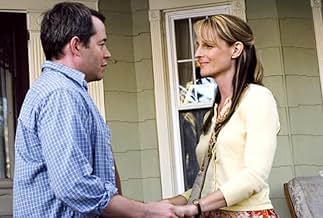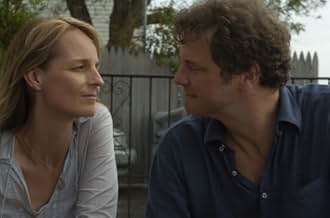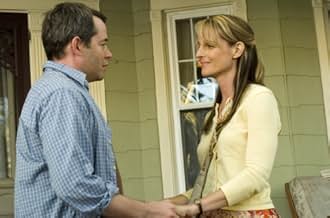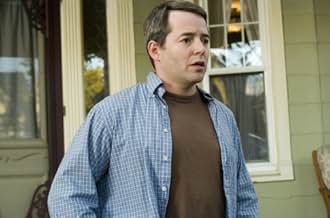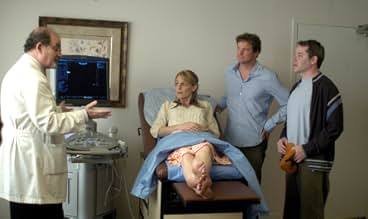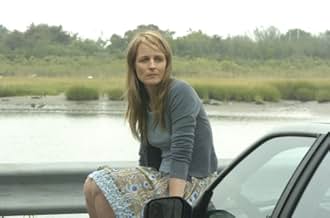April, 39 ans, veut un bébé mais son mari la quitte. Lorsque sa mère adoptive meurt, elle est contactée par sa maman bio, animatrice d'une émission télévisée. April commence à voir le père d... Tout lireApril, 39 ans, veut un bébé mais son mari la quitte. Lorsque sa mère adoptive meurt, elle est contactée par sa maman bio, animatrice d'une émission télévisée. April commence à voir le père divorcé de l'un de ses élèves à l'école.April, 39 ans, veut un bébé mais son mari la quitte. Lorsque sa mère adoptive meurt, elle est contactée par sa maman bio, animatrice d'une émission télévisée. April commence à voir le père divorcé de l'un de ses élèves à l'école.
- Réalisation
- Scénario
- Casting principal
- Récompenses
- 3 victoires et 1 nomination au total
- Sheila
- (as Lillias D. White)
- Rabbi
- (as Rabbi Kenneth A. Stern)
Avis à la une
The main character, April Epner (Helen Hunt) is never fleshed out. What we do know about her makes her incredibly unappealing. She's obsessed with her plump, middle-aged, boy-man husband (Broderick) who has left her to live in his mother's house. April is shrill and rude to her dying mother. She's manipulative and callow in her interactions with Colin Firth, the man all sensible women love and would treat like the treasure he is. In a particularly painful scene, Frank (Firth) makes a poignant confession of love to April, and she blows him off in order to gripe to her husband in a cell phone call. I was literally shouting at the screen, "Run, Colin, run! Get away from this nasty loser female as fast as ever you can!" It doesn't stop there. April attempts to have a quickie with her husband in the back seat of a car. On a busy city street. In broad daylight. With the car door open. It was such an ugly, gratuitous scene. It marked April as someone suffering from borderline personality disorder. But it doesn't stop there. April casually invites both her husband and her boyfriend to her gynecologist's office for an exam, in stirrups and johnny coat, to ascertain that she is pregnant, by her husband. WHY should we care about this woman? Why should Colin Firth be attracted to her? What inspired his poignant love confession? Nothing. There is nothing on screen, nothing in the script, that ever fleshes his attraction out.
Speaking of "flesh" if you read comments here or on the web, you can see that most viewers were fixated on how haggard Helen Hunt looks. She is very thin, and time has not been kind to her face. In some scenes, it is impossible to look at her and not want to sit her down and get some food into her, she looks that much like a refugee from some catastrophe. Some viewers applauded Hunt for being "brave" and allowing the camera access, but focusing on Helen Hunt's courage utterly detracts from ever registering April Epner as a flesh and blood human being. You're not thinking about April Epner, you're thinking, "Hmm how could Helen Hunt change her look?" Similarly, Bette Midler is never convincing as the character she is playing. She is always Bette Midler, bodacious saloon singer, breezing through a film with a script that is decidedly unworthy of any attempt on her part to bother to pretend to be anyone but Bette Midler.
Failed films like this are so painful because there are so few movies made for women over forty. The glory days that could produce a script like Mankiewicz's "All About Eve" are long behind us. Drek like this make us miss classics like that all the more. Older women do lead interesting lives. There are so many real questions that this film could have explored for a forty-plus schoolteacher whose husband wants to leave her. This film ignored all of those real questions and just plopped Colin Firth, the perfect man, and Bette Midler, STAR, in as phony, bogus attempts to stir up some kind of a plot. Sorry without writing talent and insight, which this script utterly lacks even starpower like Firth's and Middler's can't create a worthy film.
April Epner (Helen Hunt) is married to fellow schoolteacher Ben Green (Matthew Broderick) and longs to have a baby before her advancing age prevents her dream. April was adopted as an infant by a Jewish couple who subsequently gave birth to April's brother Freddy (Ben Shenkman): April has always longed to have been Freddy's biological equal, wondering what it would feel like NOT to be adopted. April's busy life implodes: Ben has decided he doesn't like his life and leaves April, April's mother dies, April meets Frank (Colin Firth) a recently divorced writer and father of two children, and April is contacted by a man who can put April in touch with her birth mother - popular TV talk show hostess Bernice Graves (Bette Midler). And if these turns of events weren't traumatic enough, April discovers that she has become pregnant by Ben and Ben is unsure whether he can handle the restructuring of his life to accommodate April. Cautiously April and Frank begin a rather tenuous courtship which is almost immediately threatened by April's discovery of her pregnant state. April and Bernice meet, exchange backgrounds, and make pacts to test their biologic relationship. How each of these characters makes promises that eventually damage each other and then resolve in unexpected ways becomes a study of the meaning of love and compassion among fragile human beings.
While not a satisfying story on every level and a film too cluttered with inconvenient editing choices, the cast is strong and obviously committed, and the story (neither a comedy or a drama but a mixture of the two) tests credibility. But there are some fine moments and the lessons in human behavior are worth examining. Not a great movie but a strong little small budget film. Grady Harp
Hunt's directorial debut, THEN SHE FOUND ME, begins so tragically but attempts then to lighten the mood with awkward comedy and untimely romance. The combination is a bizarre contradiction that just falls flat. It doesn't feel right to laugh just yet as there hasn't been time to mourn but we don't want to mourn either as we only just met these folks. We don't know how to feel or where to go and neither does the direction of the film. When the dust from April's disastrous week finally begins to settle, the film finally begins to breathe normally again and finds a particular charm in its decidedly neurotic voice. Still, it is more unsettling than it is satisfying.
While Hunt may be overly sentimental as a director, she finds a certain harshness in her acting style that becomes the film's most unifying source. As put upon as she is at this juncture in her life, she manages to juggle everything reasonably well by balancing between protecting herself, demanding what she deserves and allowing her defenses down at just the right moments and only to those who deserve entry. The woman deserves happiness, be that in the form of a new love with troubled suitor, Frank (Colin Firth), or by realizing her longtime desire to have a child, but her life only gets continuously more complicated, sometimes by her own doing. I would ordinarily want to hug someone in April's position but mostly I just wanted to shake her.
What ultimately undermines THEN SHE FOUND ME is its own air of self-loathing. Hunt spends so much time trying to incite sympathy for April by dumping so many hard realities on to her at once but then punishes her when all she has done is try to keep her head above water. It's hard to feel love for a face on the screen when the woman who put her there hasn't made up her mind herself.
6.5/10
Le saviez-vous
- AnecdotesFeature film writing, directing, and producing debut for Helen Hunt. She also acted.
- GaffesThe ultrasound picture at six weeks is not developmentally correct. At six weeks, the baby's features (hands, spine, etc.) would not be able to be distinguished; it would look more like a bean in shape.
- Citations
April Epner: Your wife was seeing someone else?
Frank: Pretty much everyone else. I was too much for her.
April Epner: Your wife? I'm sure she didn't feel that way.
Frank: She told me.
April Epner: What did she say?
Frank: 'You're too much for me.'
April Epner: Ugh.
- Bandes originalesMazel Tov Zelda - Zeydns Tants
Written by Dave Tarras
Performed by The Klezmatics
Courtesy of Rounder Records
Meilleurs choix
Détails
Box-office
- Budget
- 3 500 000 $US (estimé)
- Montant brut aux États-Unis et au Canada
- 3 735 717 $US
- Week-end de sortie aux États-Unis et au Canada
- 72 594 $US
- 27 avr. 2008
- Montant brut mondial
- 8 443 998 $US
- Durée1 heure 40 minutes
- Couleur
- Mixage
- Rapport de forme
- 1.85 : 1
Contribuer à cette page








